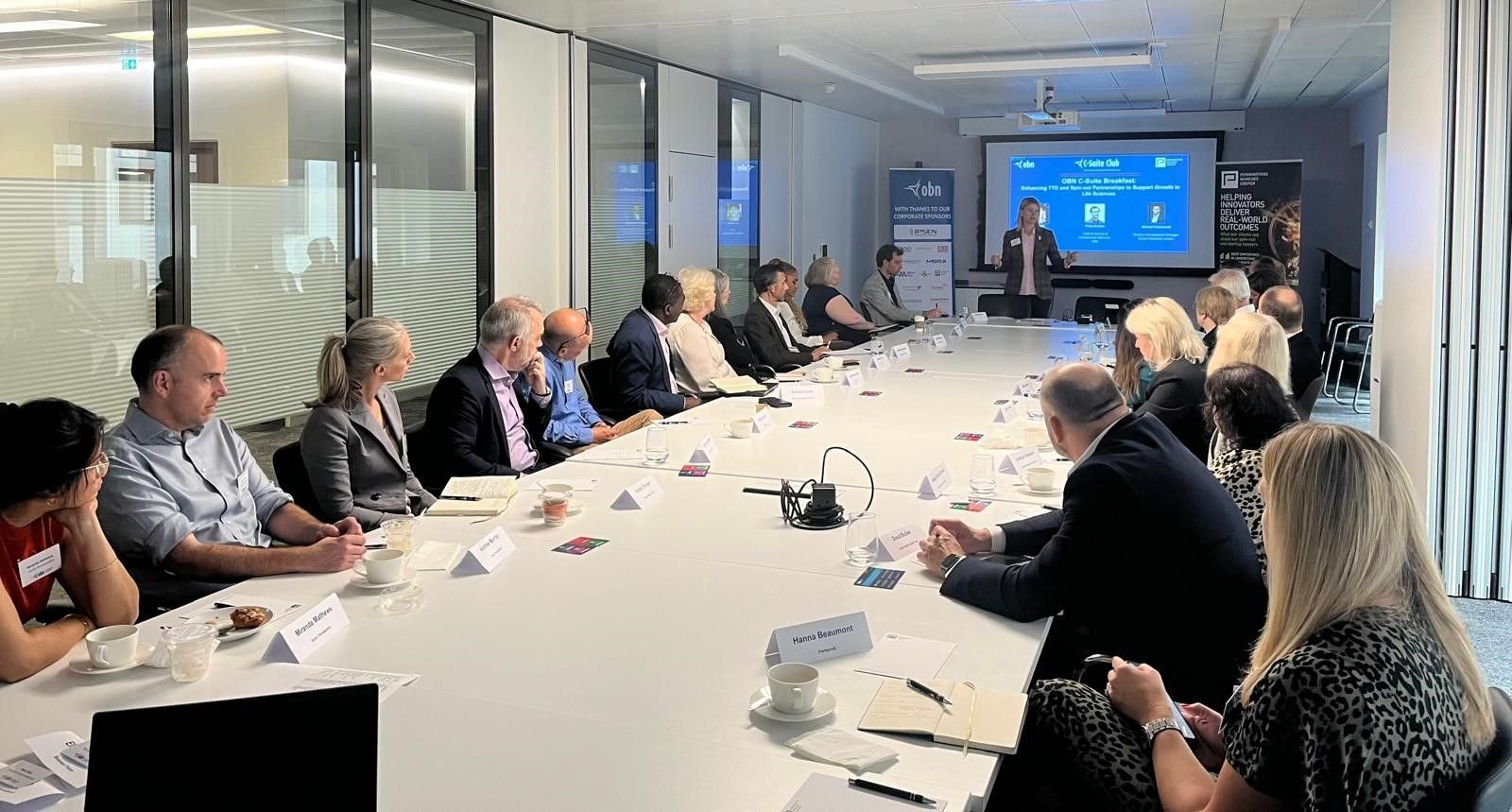Eggs-on-Toast with Tech Transfer Titans
At the recent OBN C-Suite Breakfast Discussion on ‘Enhancing TTO and Spin-out Partnerships to Support Growth in Life Sciences,’ industry leaders, investors, tech transfer advocates, entrepreneurs, and academics (me!) came together to share insights from the front lines. This event aimed to dissect the challenges and opportunities in licensing and commercialisation, fostering a transparent dialogue between the investor community, industry, and Technology Transfer Offices (TTOs).
The conversation spotlighted critical issues such as the equity stakes universities take in new ventures, which can often become a stumbling block for future investment, and the nuanced roles of foreground and background IP. Our goal was to better support emerging entrepreneurs by identifying what more is needed to help commercialise and scale the often untapped innovation and ambition within our institutions.
The morning kicked off with keynote presentations from Dr. Lisa Smith, CEO of Midlands Mindforge, an investment company co-founded by eight research-intensive universities, and Dr. Michael Joseph, Business Development Manager at Brunel University London, who oversees R&D and innovation partnerships in Healthcare and Medical Technology. Their insights set the stage for a dynamic round-table discussion, where senior leaders from the life sciences sector delved into the practicalities and potential of enhancing these critical partnerships.
As we dissect the highlights from this discussion, it’s clear that while the challenges are formidable, the opportunities for growth and innovation are boundless. Join me as I explore my personal notes and key takeaways from this pivotal event.
Key lessons you can't miss:
Foster collaboration: Leverage diverse expertise to drive innovation.
Engage early career scientists: Infuse fresh ideas by involving new researchers.
Build strategic partnerships: Open resources and opportunities through key alliances.
Promote internal networking: Strengthen community ties within your organisation.
Address real-world challenges: Focus on solving practical, topical issues.
Support professional development: Guide members in securing fellowships and grants.
Stay cutting-edge: Organise events on the latest scientific advancements.
Champion diversity and inclusion: Ensure varied perspectives are valued.
Utilise existing networks: Enhance impact through established connections.
Highlight success stories: Inspire with member achievements and initiatives.
Funders must prioritize and reward: innovative, high-risk, high-impact projects.
Personal Notes from the Breakfast
Entrepreneurial Ecosystem and Alumni Involvement
Michael emphasised that a robust entrepreneurial ecosystem within the university fosters a culture of giving back. Graduates who create jobs often employ Brunel students, reinforcing this cycle of support. This ethos is notably strong in the US, where school pride and active alumni committees play a significant role.
Academia-SME Collaborations
Michael also highlighted the importance of strong collaborations between academia and small and medium-sized enterprises (SMEs). He mentioned Brunel's RIEm2025 initiative, which offers small grants to support innovative ideas backed by both academics and industry scientists.
Funding Challenges and Market Failures
Lisa discussed how her company was formed in response to the lack of accessible funding in the Midlands. She distinguished her investment company from traditional funds, noting that the shorter investment lifecycle of funds forces biotech companies to sell their intellectual property or exit prematurely. This, she argued, represents a fundamental market failure.
Key Factors for a Thriving Entrepreneurial Ecosystem
Lisa identified three critical factors for a thriving entrepreneurial ecosystem:
Capacity to Scale
Size of Fund
Size of Cheque
She stressed that to retain companies in the UK, funds need to be large enough to support companies through to IP maturity, allowing for the issuance of substantial financial support when needed.
Discussion Highlights and Key Points
The Q&A session brought up several important issues that need addressing to strengthen the ecosystem:
USIT Guide and standardisation
The USIT guide helps entrepreneurs with negotiations, but its usage is uncertain.
Lisa noted that in equity splits, the founders' share is more crucial than the university's share.
There is a debate on the need for standardisation of documents. While standardisation can save resources and ensure fair treatment, it may contradict the entrepreneurial model of survival of the fittest.
Intellectual property (IP) protection
Enhancing our ability to protect IP and ring-fence it within specific verticals or regions is crucial.
Cultural shifts
Promoting more ambitious undertakings by young entrepreneurs.
Normalising the concept of the "5x entrepreneur" and accepting failure as part of the process.
Encouraging entrepreneurship before students even reach university.
Shifting the perception of the one-time successful entrepreneur turning into a tech transfer officer or passive investor.
Staffing new companies
Addressing the pull into the spinout model.
There’s increased immigrant uptake in entrepreneurial training and job opportunities, leading to a lack of locally trained talent.
Scientists are often encouraged to travel abroad for better learning opportunities, leading to a lack of locally trained talent.
SMEs are often restricted to hire local talent with right-to-work permits but are restricted by local talent pools.
Solutions might include:
Allowing SMEs to hire immigrants on shorter-term contracts.
Investing in local talent by reserving some entrepreneurial opportunities for them.
Incentivising the return of highly trained and skilled individuals to the UK workforce.
These points underscore the need for strategic initiatives & cultural changes to foster a more robust and inclusive entrepreneurial ecosystem in the UK.
Lack of ambition in the UK innovation ecosystem?
During the discussion, a question was posed to attendees about whether the UK ecosystem lacks ambitious young scientists. Having worked in both the US and the UK as a scientist, I can provide the following perspective:
Early career scientists in the UK are just as hungry and ambitious as their US counterparts, but the infrastructure and ethos are entirely different.
The main difference between the US and UK entrepreneurial ecosystems lies in the approach to risk-taking and the support structures for innovation. In the US, there is a strong culture of embracing high-risk, high-reward projects, and failure is often seen as a valuable learning experience. This attitude is supported by a robust network of venture capital, angel investors, and an entrepreneurial community that encourages bold ventures and rapid scaling. In the US, if you’re trying something new as an entrepreneur you are a rock star.
In contrast, the UK ecosystem tends to be more risk-averse. Funding structures and institutional support often favour more conservative, incremental advancements. This cautious approach can stifle the ambition of young scientists and entrepreneurs, as there is less encouragement and fewer resources available for pursuing innovative and high-risk projects. Additionally, the availability of large-scale funding is limited, as discussed by Lisa, making it challenging for startups to secure the necessary capital to scale effectively. In the UK, if you’re trying something new as an entrepreneur you are probably crazy.
But the problem, from a biotech perspective, might also start from academia. The academic mindset among many established group leaders often focuses on fundamental research, with much less emphasis on translating discoveries into commercial ventures. One might ask: do academics lack the right incentives to promote translational projects in their labs, given that their performance is still primarily assessed based on publications and the criteria set by their grant funders? This traditional approach could be limiting the drive for entrepreneurial activities among younger scientists, who may feel discouraged from pursuing translational research and innovation to meet the publication or grant requirements.
While both systems have their strengths, the UK's more conservative approach may hinder the full potential of its entrepreneurial talent. To foster a more vibrant and dynamic innovation landscape, a cultural shift is needed—one that encourages greater ambition, risk-taking, and support for translational research. This shift might start with the funders, who also need to evolve to prioritize and reward innovative and high-impact projects. Only by addressing these systemic issues can the UK fully unleash the potential of its entrepreneurial ecosystem.
Disclaimers:
* My personal notes should be largely correct, though I'm only human!
One day I’ll get you to … Join the dialogue—reflect, share your tales from the trenches, and by all means correct me if you spot any erroneous information.




